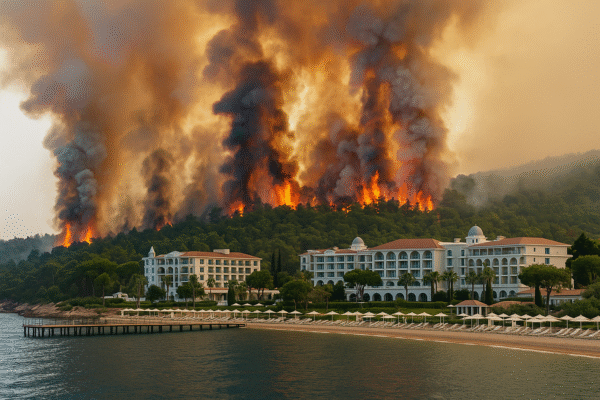The global tourism industry, already navigating post-pandemic recovery, is now confronted with mounting environmental crises. Recent wildfires near luxury resorts in Turkey and severe drought across the northeastern United States reveal how climate change is no longer a distant concern but an immediate reality. These unfolding events highlight the fragility of global travel destinations and serve as a wake-up call for governments, travelers, and the tourism sector to rethink sustainability.
Luxury resorts in Antalya, Turkey—a destination beloved for its beaches, cultural heritage, and Mediterranean climate—were forced to evacuate guests due to a fast-moving wildfire. Simultaneously, drought in New York and New England is straining natural resources, increasing wildfire risks, and altering landscapes. Together, these disasters underscore how climate instability is reshaping the future of travel.
Wildfires Threaten Resorts in Turkey
On September 19, 2025, a wildfire swept dangerously close to the Titanic Deluxe Golf Belek Resort in Antalya province. Emergency crews acted swiftly, evacuating guests as flames approached the property. While the fire was eventually contained without major structural damage, the incident created panic among travelers and drew international attention to Turkey’s growing wildfire risks.
Impact on Tourism in Antalya
Antalya is one of Turkey’s tourism hubs, hosting millions of visitors annually. Wildfires disrupt not only resorts and tour operators but also local economies that rely heavily on seasonal tourism. Hotel evacuations, cancellations, and heightened safety concerns deter visitors, putting pressure on an industry that contributes significantly to Turkey’s GDP.
Government and Community Response
Turkish officials have increased investment in fire prevention and crisis management. Local authorities are enhancing early-warning systems and improving evacuation protocols to ensure traveler safety. These efforts, while commendable, illustrate the difficult balance between promoting tourism and addressing the immediate risks of climate disasters.
Drought Paralyzes the Northeast US
Across the Atlantic, the northeastern United States is experiencing one of its driest years in decades. By September 2025, more than 80% of the region faced abnormally dry or severe drought conditions, according to national monitoring agencies. Water levels in rivers, lakes, and reservoirs have dropped significantly, affecting both urban centers like New York City and rural communities in New England.
How Drought Is Affecting Tourism
The drought has multiple consequences for the travel industry. Nature-based tourism, including hiking, camping, and river tours, faces restrictions due to fire hazards and dwindling water flows. Popular fall foliage trips are being impacted as trees shed leaves prematurely, leaving tourists with less vibrant landscapes. Additionally, rising wildfire risks in forested areas of Vermont, New Hampshire, and Maine are prompting park closures and travel advisories.
Steps Taken by Authorities
State and federal agencies have urged residents and businesses to conserve water, while simultaneously preparing for heightened wildfire activity. The Federal Emergency Management Agency (FEMA) is working with local governments to strengthen drought response strategies, emphasizing public education and resource management. Tourism boards in affected regions are also adjusting marketing campaigns to focus on safe, sustainable travel experiences.
A Global Trend: Climate Change and Tourism
While Turkey and the US are separated by continents, the crises they face are connected by one driving force: climate change. Wildfires and droughts are increasing in frequency and severity worldwide due to rising temperatures and shifting weather patterns. This global reality is challenging how destinations prepare for and respond to natural disasters.
Economic and Social Costs
Tourism-dependent economies face steep financial losses during crises. Hotel evacuations, canceled bookings, and damaged natural attractions reduce revenue, while communities reliant on tourism jobs face uncertainty. In the US, drought-related restrictions on outdoor recreation harm small businesses. In Turkey, the reputational impact of wildfires threatens future visitor confidence.
Sustainability as the Future of Travel
Experts emphasize that the future of global tourism depends on adopting sustainable practices. Eco-friendly infrastructure, resilient community planning, and climate-conscious travel decisions are vital. Travelers are increasingly seeking destinations that prioritize environmental stewardship, pushing the industry to adapt to evolving expectations.
Government Actions: Prevention and Preparedness
Governments in both Turkey and the US are implementing measures to address climate-related tourism challenges.
- Turkey’s Strategy: Expanding firefighting resources, increasing disaster response training, and implementing stricter building codes in fire-prone regions.
- US Measures: Enhancing drought monitoring, investing in wildfire detection systems, and expanding public outreach on water conservation and fire safety.
These actions highlight a recognition of climate change as not just an environmental issue, but also a direct threat to economic stability and public safety.
The Future of Global Travel
The tourism industry is at a crossroads. Climate disasters like wildfires in Turkey and drought in the US are not isolated events but part of a pattern that demands urgent global attention. For travelers, the reality is clear: destination choices, travel timing, and personal environmental impact matter more than ever.
Short-Term Needs
- Robust evacuation plans for tourists
- Enhanced public awareness campaigns on safety
- Stronger disaster management systems in tourist hubs
Long-Term Solutions
- International collaboration on climate resilience
- Sustainable infrastructure investment
- Encouraging responsible tourism practices
Conclusion
The recent crises in Turkey and the northeastern US are stark reminders that global tourism cannot ignore the realities of climate change. From fire-evacuated resorts to drought-stressed forests, the travel industry faces unprecedented risks. Yet, these challenges also present an opportunity: to build a tourism model that is safer, more sustainable, and resilient in the face of an unpredictable future.
Travelers, governments, and industry leaders must come together to protect both destinations and communities. The future of global tourism depends not on resisting change but on embracing sustainability as the cornerstone of exploration and discovery.
For more travel news like this, keep reading Global Travel Wire
















